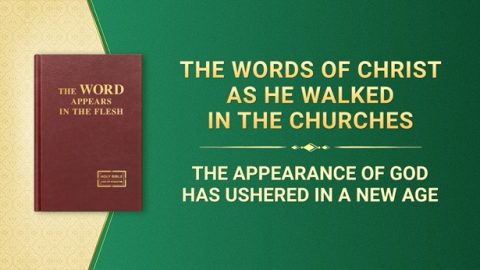15. The Notion of the Religious World That: “When the Lord Jesus Returns, He Will Be Male, Rather Than Female”
The religious world believes that since the Lord Jesus is male, when He returns, He will still be male rather than female.
Words From the Bible
“God created man in His own image, in the image of God created He him; male and female created He them” (Genesis 1:27).
Words of Almighty God of the Last Days
He who is God incarnate shall possess the essence of God, and He who is God incarnate shall possess the expression of God. Since God becomes flesh, He shall bring forth the work He intends to do, and since God becomes flesh, He shall express what He is, and shall be able to bring the truth to man, bestow life upon him, and point the way for him. Flesh that does not have the essence of God is decidedly not the incarnate God; of this there is no doubt. If man intends to inquire into whether it is God’s incarnate flesh, then he must corroborate this from the disposition He expresses and the words He speaks. Which is to say, to corroborate whether or not it is God’s incarnate flesh, and whether or not it is the true way, one must discriminate on the basis of His essence. And so, in determining whether it is the flesh of God incarnate, the key lies in His essence (His work, His utterances, His disposition, and many other aspects), rather than external appearance. If man scrutinizes only His external appearance, and as a result overlooks His essence, this shows that man is benighted and ignorant.
—The Word, Vol. 1. The Appearance and Work of God. Preface
Each stage of work done by God has its own practical significance. Back then, when Jesus came, He came in male form, and when God comes this time, His form is female. From this, you can see that God’s creation of both men and women can be of use in His work, and with Him there is no distinction of gender. When His Spirit comes, He can take on any flesh He pleases, and that flesh can represent Him; whether male or female, it can represent God as long as it is His incarnate flesh. If Jesus had appeared as a female when He came, in other words, if an infant girl, and not a boy, had been conceived by the Holy Spirit, that stage of work would have been completed all the same. If that had been the case, then the present stage of work would have to be completed by a male instead, but the work would be completed all the same. The work done in each stage has its significance; neither stage of work is repeated, nor does it conflict with the other. At the time, Jesus, in doing His work, was called the only Son, and “Son” implies the male gender. Why is the only Son not mentioned in this current stage? Because the requirements of the work have necessitated a change in gender from that of Jesus. With God there is no distinction of gender. He does His work as He wishes, and in doing His work He is not subject to any restrictions, but is especially free. Yet every stage of work has its own practical significance. God became flesh twice, and it is self-evident that His incarnation during the last days is the final time. He has come to make known all His deeds. If in this stage He did not become flesh in order personally to do work for man to witness, man would forever cling to the notion that God is only male, not female. Before this, all humanity believed that God could only be male and that a female could not be called God, for all humanity regarded men as having authority over women. They believed that no woman could take on authority, only men. What is more, they even said that man was the head of woman and that woman must obey man and could not surpass him. In times past, when it was said that man was woman’s head, this was directed at Adam and Eve, who had been beguiled by the serpent—not at man and woman as they had been created by Jehovah in the beginning. Of course, a woman must obey and love her husband, and a husband must learn to feed and support his family. These are the laws and decrees set forth by Jehovah that humankind must abide by in their lives on earth. Jehovah said to woman, “Your desire shall be to your husband, and he shall rule over you.” He spoke thus only so that humankind (that is, both man and woman) might live normal lives under the dominion of Jehovah, and so that the lives of humankind might have a structure, and not fall out of their proper order. Therefore, Jehovah made appropriate rules for how man and woman should act, though this was only in regard to all the created beings living on the earth, and bore no relation to God’s incarnate flesh. How could God be the same as His created beings? His words were directed only toward the humankind of His creation; it was in order for humankind to live normal lives that He established rules for man and woman. In the beginning, when Jehovah created humankind, He made two kinds of human being, both male and female; and so there is the division of male and female in His incarnate fleshes. He did not decide His work based on the words He spoke to Adam and Eve. The two times He has become flesh have been determined entirely according to His thinking at the time He first created humankind; that is, He has completed the work of His two incarnations based on the male and the female before they were corrupted. … When Jehovah twice became flesh, the gender of His flesh was related to the male and the female who had not been beguiled by the serpent; it was in accordance with the male and the female who had not been beguiled by the serpent that He twice became flesh. Do not think that the maleness of Jesus was the same as that of Adam, who was beguiled by the serpent. The two are completely unrelated, they are males of two different natures. Surely it cannot be that the maleness of Jesus proves He is the head of all women but not of all men? Is He not the King of all the Jews (including both men and women)? He is God Himself, not just the head of woman but the head of man as well. He is the Lord of all created beings and the head of all created beings. How could you determine the maleness of Jesus to be the symbol of the head of woman? Would this not be blasphemy? Jesus is a male who has not been corrupted. He is God; He is Christ; He is the Lord. How could He be a male like Adam who was corrupted? Jesus is the flesh worn by the most holy Spirit of God. How could you say He is a God who possesses the maleness of Adam? In that case, would not all of God’s work have been wrong? Would Jehovah have incorporated within Jesus the maleness of Adam who was beguiled by the serpent? Is not the incarnation of the present time another instance of the work of God incarnate, who is different in gender from Jesus but like Him in nature? Do you still dare say that God incarnate could not be female, because woman was the first to be beguiled by the serpent? Do you still dare say that, as woman is the most unclean and the source of the corruption of humankind, God could not possibly become flesh as a female? Do you dare to persist in saying that “woman shall always obey man and may never manifest or directly represent God”?
—The Word, Vol. 1. The Appearance and Work of God. The Two Incarnations Complete the Significance of the Incarnation
If God came into the flesh only as a male, people would define Him as male, as the God of men, and would never believe Him to be the God of women. Men would then hold that God is of the same gender as men, that God is the head of men—but what then of women? This is unfair; is it not preferential treatment? If this were the case, then all those whom God saved would be men like Him, and not one woman would be saved. When God created mankind, He created Adam and He created Eve. He did not only create Adam, but made both male and female in His image. God is not only the God of men—He is also the God of women. God enters upon a new stage of work in the last days. He will reveal even more of His disposition, and it will not be the compassion and love of the time of Jesus. Since He has new work in hand, this new work will be accompanied by a new disposition. … God really and truly lives among men. He is tangible; man can actually engage with His disposition, engage with what He has and is; only in this way can man truly come to know Him. At the same time, God has also completed the work in which “God is the God of men and the God of women,” and accomplished the entirety of His work in the flesh.
—The Word, Vol. 1. The Appearance and Work of God. The Vision of God’s Work (3)
If only the work of Jesus was done, and was not complemented by work in this stage of the last days, man would forever cling to the notion that Jesus alone is the only Son of God, that is, that God has only one son, and that anyone who comes thereafter by another name would not be the only Son of God, much less God Himself. Man has the notion that anyone who serves as a sin offering or who assumes power on God’s behalf and redeems all humankind, is the only Son of God. There are some who believe that as long as the One who comes is a male, He may be deemed the only Son of God and God’s representative. There are even those who say that Jesus is the Son of Jehovah, His only Son. Are such notions not overblown? If this stage of work were not done in the final age, then toward God the whole of humankind would be veiled under a dark shadow. If this were the case, man would think himself higher than woman, and women would never be able to hold their heads up, and then not even a single woman could be saved. People always believe that God is male, and moreover that He has always despised woman and would not grant her salvation. If this were the case, would it not be true that all women, who were created by Jehovah and who have also been corrupted, would never have the opportunity to be saved? Then would it not have been pointless for Jehovah to have created woman, that is, to have created Eve? And would not woman perish for eternity? For this reason, the stage of work in the last days is undertaken in order to save the whole of humankind, not just woman. If anyone should think that were God to be incarnated as female, it would solely be for the sake of saving woman, then that person would indeed be a fool!
—The Word, Vol. 1. The Appearance and Work of God. The Two Incarnations Complete the Significance of the Incarnation
Jesus and I come from one Spirit. Even though We are unrelated in Our fleshes, Our Spirits are one; even though the content of what We do and the work that We take on are not the same, We are alike in essence; Our fleshes take different forms, but this is due to the change in era and the differing requirements of Our work; Our ministries are not alike, so the work We bring forth and the dispositions We reveal to man are also different. That is why what man sees and understands this day is unlike in the past, which is because of the change in era. For all that They are different in the gender and the form of Their fleshes, and that They were not born of the same family, still less in the same time period, Their Spirits are nonetheless one. For all that Their fleshes share neither blood nor physical kinship of any kind, it cannot be denied that They are the incarnate fleshes of God in two different time periods. That They are the incarnate fleshes of God is an irrefutable truth. However, They are not of the same bloodline and do not share a common human language (one was a male who spoke the language of the Jews and the other a female who only speaks Chinese). It is for these reasons that They have lived in different countries to do the work that it behooves each one to do, and in different time periods too. Despite the fact that They are the same Spirit, possessed of the same essence, there are no absolute similarities between the outward shells of Their fleshes. All They share is the same humanity, but as far as external appearance of Their fleshes and the circumstances of Their birth are concerned, They are not alike. These things have no impact on Their respective work or on the knowledge that man has of Them, for, in the final analysis, They are the same Spirit and none can separate Them. Even though They are not related by blood, Their entire beings are in the charge of Their Spirits, which allocate to Them different work in different time periods, and Their fleshes are of different bloodlines. The Spirit of Jehovah is not the father of the Spirit of Jesus, and the Spirit of Jesus is not the son of the Spirit of Jehovah: They are one and the same Spirit. Similarly, the incarnate God of today and Jesus are not related by blood, but They are one, this is because Their Spirits are one. God can do the work of mercy and lovingkindness, as well as that of the righteous judgment and of chastisement of man, and that of calling down curses on man; and in the end, He can do the work of destroying the world and punishing the evil. Does He not do all of this Himself? Is this not the omnipotence of God?
—The Word, Vol. 1. The Appearance and Work of God. The Two Incarnations Complete the Significance of the Incarnation
Among humans, I was the Spirit that they could not see, the Spirit that they could never engage with. Because of My three stages of work on earth (creation of the world, redemption, and destruction), I appear in their midst at different times (never publicly) to do My work amongst them. The first time I came among humans was during the Age of Redemption. Of course, I came into a Jewish family; as such, the first to see God’s coming to earth were the Jews. The reason I did this work in person was that I wanted to use My incarnate flesh as a sin offering in My work of redemption. Thus, the first to see Me were the Jews in the Age of Grace. That was the first time I worked in the flesh. In the Age of Kingdom, My work is to conquer and perfect, so I again do My shepherding work in the flesh. This is My second time working in the flesh. In the final two stages of work, what people engage with is no longer the invisible, intangible Spirit, but a person who is the Spirit realized as flesh. Thus, in the eyes of man, I again become a human, with none of the look and feel of God. Moreover, the God that people see is not only male, but also female, which is most astounding and puzzling to them. Time and time again, My extraordinary work has shattered old beliefs held for many, many years. People are stunned! God is not merely the Holy Spirit, the Spirit, the sevenfold intensified Spirit, or the all-encompassing Spirit, but is also a human—an ordinary human, an exceptionally common human. He is not only male, but also female. They are similar in that They are both born to humans, and dissimilar in that one was conceived by the Holy Spirit and the other was born to a human, though derived directly from the Spirit. They are similar in that both incarnate fleshes of God carry out the work of God the Father, and dissimilar in that one performed the work of redemption while the other does the work of conquest. Both represent God the Father, but one is the Redeemer, filled with lovingkindness and mercy, and the other is the God of righteousness, filled with wrath and judgment. One is the Supreme Commander who launched the work of redemption, while the other is the righteous God who accomplishes the work of conquest. One is the Beginning, the other the End. One is sinless flesh, while the other is flesh that completes the redemption, continues the work, and is never sinful. Both are the same Spirit, but They dwell in different fleshes and were born in different places, and They are separated by several thousand years. However, all Their work is mutually complementary, never conflicting, and can be spoken of in the same breath. Both are people, but one was a baby boy and the other was an infant girl. For all these many years, what people have seen is not only the Spirit and not only a human, a male, but also many things that do not jibe with human notions; as such, humans are never able to fully fathom Me. They keep half-believing and half-doubting Me—as if I do exist, yet am also an illusory dream—which is why, to this day, people still do not know what God is. Can you really sum Me up in one simple sentence? Do you truly dare to say, “Jesus is none other than God, and God is none other than Jesus”? Are you really so bold as to say, “God is none other than the Spirit, and the Spirit is none other than God”? Are you comfortable saying, “God is just a human clothed in flesh”? Do you truly have the courage to assert, “The image of Jesus is the great image of God”? Are you able to use your eloquence to thoroughly explain God’s disposition and image? Do you really dare to say, “God created males only, not females, after His own image”? If you say this, then no female would be among My selected, much less would females be one class of humankind. Now do you truly know what God is? Is God a human? Is God a Spirit? Is God really a male? Can only Jesus complete the work I am to do? If you choose only one of the above to sum up My essence, then you are an exceedingly ignorant loyal believer. If I worked as incarnate flesh once, and only once, would you delimit Me? Can you really understand Me thoroughly at a single glance? Can you really sum Me up completely based on what you have been exposed to during your lifetime? If I did similar work in both My incarnations, how would you perceive Me? Would you leave Me forever nailed to the cross? Could God be as simple as you claim?
—The Word, Vol. 1. The Appearance and Work of God. What Is Your Understanding of God?
Related Sermons
Why Is the God Incarnate of the Last Days Female?
Related Hymns
God’s Two Incarnations Can Both Represent Him
Is God As Simple As You Say?
Is God’s Incarnation a Simple Thing?




